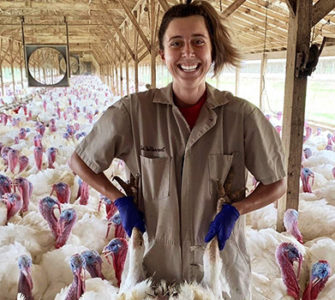Feed additive appears to benefit gut integrity in broilers with coccidiosis
The feed additive sodium bisulfate administered to broilers during a coccidial challenge appeared to benefit gut integrity, Elle Chadwick, Graduate Research Assistant,* North Carolina State University, told Poultry Health Today.
Chadwick and colleagues have been studying the interaction of diet and disease and its impact on weight and intestinal integrity. Their study with 1,200 male broilers included a comparison of results in broilers that received diets with or without sodium bisulfate during a coccidial challenge.
Broilers from different treatment groups were scored for coccidial lesions, and histologic samples were collected for measuring villi. The investigators also administered fluorescein isothiocyanate-dextran, a florescent dye, which enabled them to assess gut permeability. Chickens drink the dye, then blood is collected and the amount of dye that moves from the digestive tract into the blood indicates the permeability of the intestines, Chadwick explained.
When sodium bisulfate was added to the diet, there appeared to be no impact in birds that were not challenged with coccidia, but “it seems that there was some sort of benefit when the birds were being challenged,” she said. She later clarified those benefits were to weight gain, intestinal structure and intestinal integrity.
“I think that there’s a potential for this product and a lot of other feed additives if we look at both gut integrity and then also [at] growth,” Chadwick said.
Consensus is lacking regarding the ideal size and length of the villi, she said, but generally speaking, “you would like long and relatively thick villi [in the upper digestive tract]” and a large surface area to enable the absorption of as many nutrients as possible, she continued. At the bottom of the villi are crypts, which is where cells proliferate and “where the magic happens.” If there’s something that disturbs the crypt, that’s usually a sign of disease.
In an earlier study, Chadwick and colleagues looked at acute heat stress in broilers that were fed sodium bisulfate. Although they didn’t find a difference in weight, they did see a difference in villi maintenance and a difference in mortality among birds that received the feed additive. Birds that were heat stressed but did not receive the feed additive ended up drinking more water, leading to flushing, and had poor nutrient absorption.
*Chadwick was a graduate research assistant at the time of this interview. She has since earned her PhD.
Posted on September 16, 2021















